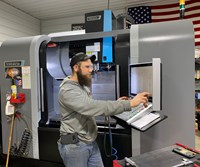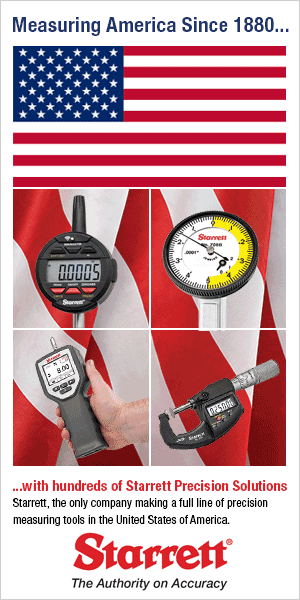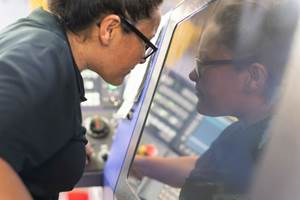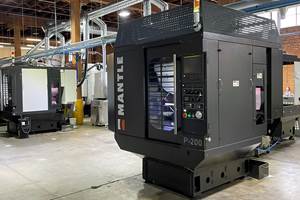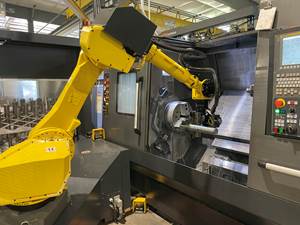Two Generations of Lessons from the Shop Floor
There are many hard-won lessons that come from running a family-owned shop, here are a few favorites.
Share
There are not many minutes in a day, week or month that I am able to sit back and reflect on our shop’s operations. At Chapter 2 Inc. we are continuously innovating, finding solutions to problems and upholding employee culture during COVID-19. My business card states my job title as CEO, but I tend to wear many different hats each day. This is true for many management- and executive-level employees as well. Writing this column has been a great opportunity for us as a family-owned machine shop to take the time to sit back and reflect on our company and what we have learned through the years.
Hire Strategically
After sitting down with my dad and sister to discuss some of the things that have driven our success, we quickly agreed that, as leaders, we cannot be scared to hire and surround ourselves with people who are smarter than us. We must be vulnerable to the idea that people will know more than we do and that our role is not to be the smartest. Instead, we are here to run a business and to make sure the doors stay open. With this comes trust in our team, allowing them to make decisions even though we might feel the impulse to be involved in all company decisions. At times, this means letting our employees fail, but there is no greater learning experience than to learn from one’s own mistakes.
Plan for the Future
I have always intended to be involved with our family business. I knew I was not interested in becoming a tradesman, so I went to school for business, which was my strength. This stands in contrast to my dad who has worked for Chapter 2 for over 40 years and owned it with my mom for 35 years. They were able to grow the business because of my dad’s advanced manufacturing knowledge, but we all know that he will not work forever despite his threats to do so. This is another reason why it is has been important to hire and groom technically advanced people to fill that void. One of Chapter 2’s competitive advantages is our people. We have degreed engineers and advanced operations team members who can work together on what is best for the company, our customers and employees.
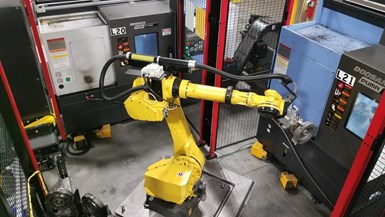
A robotic tending cell in the CNC shop.
Photo Credit: Chapter 2
Change with the Times
We have also learned to take a step back and adjust job duties for those who have reached their capacity in a certain area. Industry is ever evolving and advancing, and we need to have the correct employees in place to ensure Chapter 2 stays at the forefront of manufacturing. Over the years, we have made some transitions in job duties and hired to fit the business needs. This does not mean that we need to fire someone or demote them — their competences are still an important asset to the company. However, it is important to recognize necessary change for the sake of the business.
Embrace Culture
One thing that has remained an important factor for Chapter 2 is the employee culture. The company started out small, with that feeling of a “ma and pa shop.” As the company rapidly grew, the family worked hard to make all employees feel like family. My dad has always believed in spending time on the shop floor and instilled that in my sister and me early on. Most days, my position keeps me tied to my desk, but finding the time to walk the shop floor proves to be just as important as meeting a deadline on a quote or project. When the COVID-19 pandemic hit, we had to react quickly and make many decisions for our employees’ well-being. When business slowed, we had to lay employees off on a paid furlough. This is the last thing that we wanted to do to our employees, but it was in their best interest despite not feeling like it at the time. We needed to ensure that there was a business for them to come back to.
The success of Chapter 2 lies in the hands of those who surround us.
Reflecting on these lessons with my dad and sister has been a reminder that a family-owned business dynamic can be trying at times, but our business was built on a strong foundation of putting family first. The success of Chapter 2 lies in the hands of those who surround us. We will continue to nurture and strengthen our relationships with our employees and make sure we have the right strengths in the right places to prosper for years to come.
About the Author
Kyle Johnston
The second-generation CEO of Chapter 2 Inc. Over the 11 years he’s worked there, he has worn many different hats as he learned and grew with the company. Since 2018, he has co-owned the company with his sister Kali Garman.
Related Content
-
Will the “Great Resignation” Become an Opportunity for Manufacturers? Get Ready for the Returning 3 Million
The Great Resignation will become a Great Reapplication when employees currently able to stay out of the workforce return to it looking for something better. Machining employers that are already evaluating candidates for fit, without demanding specific skills coming in, might be positioned well to draw upon this wave.
-
In Moldmaking, Mantle Process Addresses Lead Time and Talent Pool
A new process delivered through what looks like a standard machining center promises to streamline machining of injection mold cores and cavities and even answer the declining availability of toolmakers.
-
Same Headcount, Double the Sales: Successful Job Shop Automation
Doubling sales requires more than just robots. Pro Products’ staff works in tandem with robots, performing inspection and other value-added activities.
Related Content
Will the “Great Resignation” Become an Opportunity for Manufacturers? Get Ready for the Returning 3 Million
The Great Resignation will become a Great Reapplication when employees currently able to stay out of the workforce return to it looking for something better. Machining employers that are already evaluating candidates for fit, without demanding specific skills coming in, might be positioned well to draw upon this wave.
Read MoreIn Moldmaking, Mantle Process Addresses Lead Time and Talent Pool
A new process delivered through what looks like a standard machining center promises to streamline machining of injection mold cores and cavities and even answer the declining availability of toolmakers.
Read MoreSame Headcount, Double the Sales: Successful Job Shop Automation
Doubling sales requires more than just robots. Pro Products’ staff works in tandem with robots, performing inspection and other value-added activities.
Read More8 Ways to Increase Productivity on the Manufacturing Floor
When it comes to machine shop productivity, continuous improvement depends on efficient employees, equipment and processes.
Read MoreRead Next
3 Mistakes That Cause CNC Programs to Fail
Despite enhancements to manufacturing technology, there are still issues today that can cause programs to fail. These failures can cause lost time, scrapped parts, damaged machines and even injured operators.
Read MoreThe Cut Scene: The Finer Details of Large-Format Machining
Small details and features can have an outsized impact on large parts, such as Barbco’s collapsible utility drill head.
Read More
